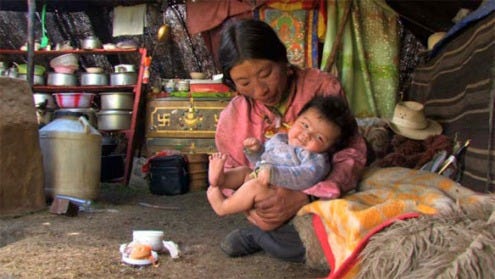Summer Pasture

for info and showtimes, click here.
This spare, elegiac documentary from directors Lynn True and Nelson Walker III and co-director Tserling Perlo is an intimate look at the lives of nomads in Kham, Tibet. Illiterate and shut off ethnically, linguistically and politically from the Chinese who surround them, these yak herders scrape out a hardscrabble existence that seems bleak and full of despair to foreign eyes.
But there is joy and laughter amid this life that is never more than a few steps away from death.
The filmmakers focus on one young couple, Locho and his wife, Yama. Their broad faces are etched by the elements, but they are perhaps in their mid-20s. They have a baby daughter, an adorable puff of stiff black hair and chubby cheeks, and a few dozen yaks upon which they rely for food, clothing and even their home. They patch their tent with the animals' fur and use their dried dung to heat it against the winds that blow bitter cold even during the warm months.
The film's title refers to their summer home. As the film approaches its end, the time comes for them to move to their winter pasture. It's an astonishing thing to watch these two people, with the help of Locho's brother, break down their entire domicile in a matter of hours and load it up for transport.
Things are changing rapidly for these people. They are under the yoke of the Chinese government, which forbids them from having more than three children. Locho had an illegitimate child with another woman shortly after marrying Yama and not only did they have to pay off the woman, her child counts against their family's "quota" of offspring.
At least Yama's two children who died while still babies do not. Such is the tenuous nature of their lives that they dare not even give their daughter a name until she reaches at least one year of age, perhaps two or three. They hope to have one more child to reach their limit but worry about feeding the one they have.
Meanwhile, Yama has troubling health concerns. She has heart disease and a swollen liver and spent much of the previous winter bedridden. It seems hard to believe watching this dynamo of a woman who never seems to stop working — cooking, cleaning, making rope and tending to their little girl. At one point, Yama reveals she was a herder herself before marriage and longs for the days of freedom riding in the pastures.
Locho isn't a bad sort, but he's clearly not the most ambitious nomad on the plains. He seems to do as little work as possible to get by, and several times during the movie, the yaks or horses wander off. He worries constantly about how many nomads are leaving the pastures to live in the cities and seems resigned to making the choice himself when their child is old enough to go to school.
Lately, they have been supplementing their meager income by harvesting caterpillar fungus, which is used for dietary and medicinal purposes by the "civilized" people to whom they sell it. Locho hordes these strange-looking plants like gold but is wise enough to know the trade could disappear at any time.
The relationship between man and wife is a joy to watch. They snipe and tease and banter and fib to each other, but it's clear their love is a palpable thing despite never exchanging any sort of physical intimacy the filmmakers are allowed to record.
The way of life of the nomad is passing before our eyes, but we have "Summer Pasture" to give us a delightful glimpse as they fade from memory.
4 Yaps



